Unit2 Getting along单词精讲讲义 外研版(2024)八年级英语上册
文档属性
| 名称 | Unit2 Getting along单词精讲讲义 外研版(2024)八年级英语上册 | 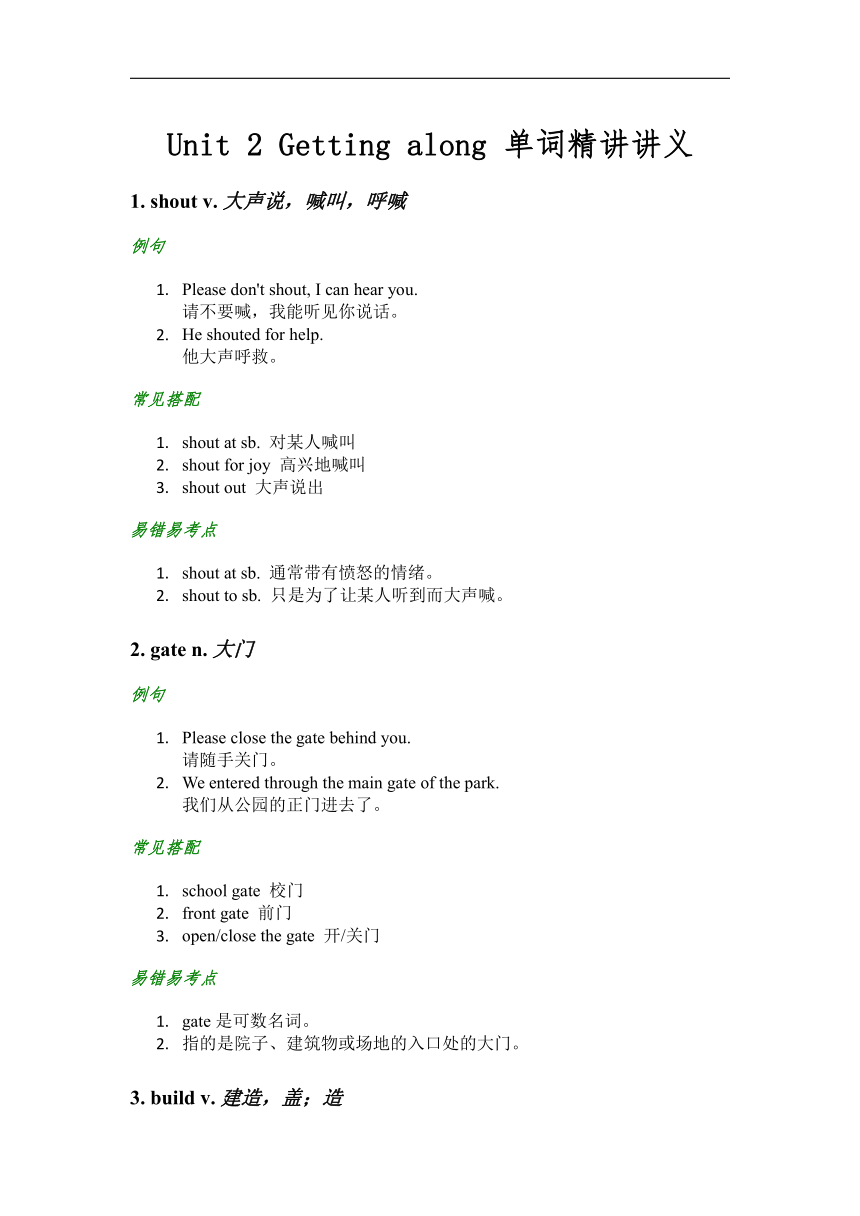 | |
| 格式 | docx | ||
| 文件大小 | 39.0KB | ||
| 资源类型 | 教案 | ||
| 版本资源 | 外研版 | ||
| 科目 | 英语 | ||
| 更新时间 | 2025-08-24 10:34:43 | ||
图片预览

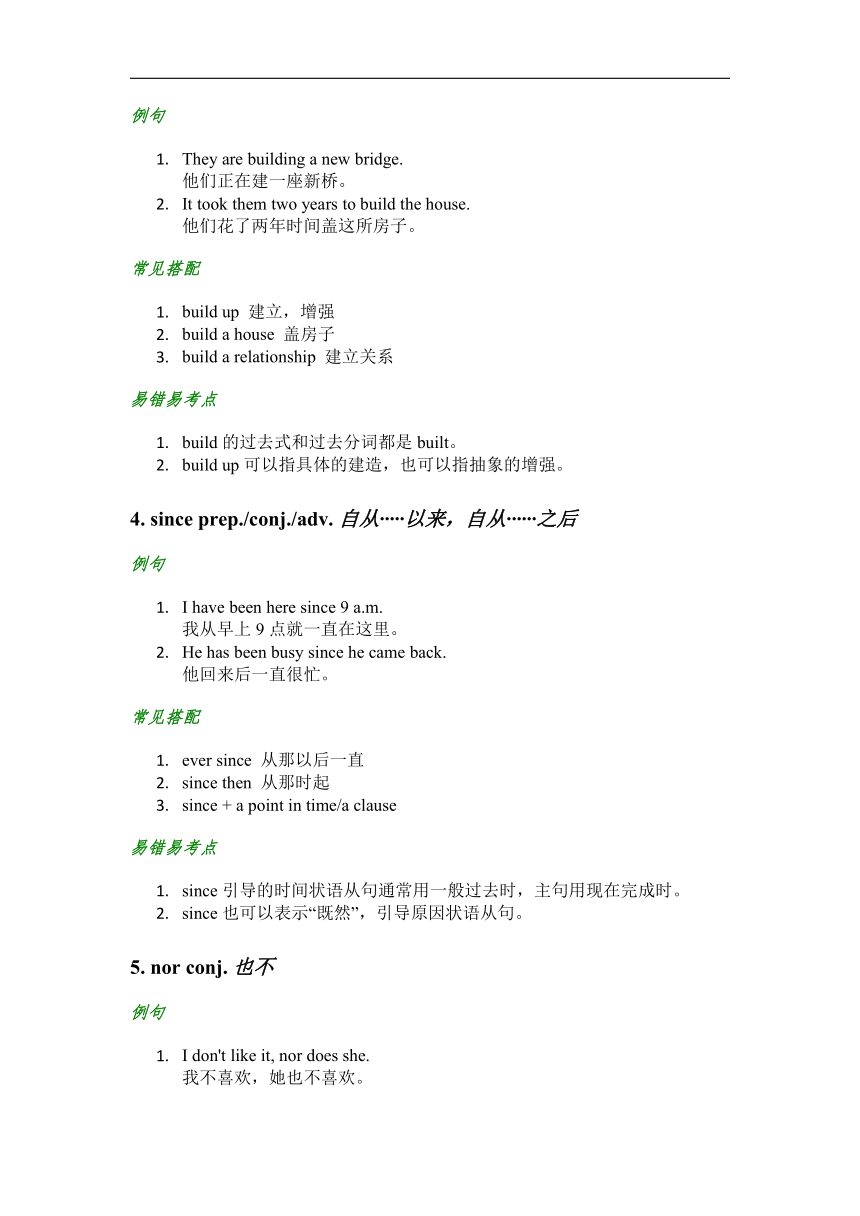
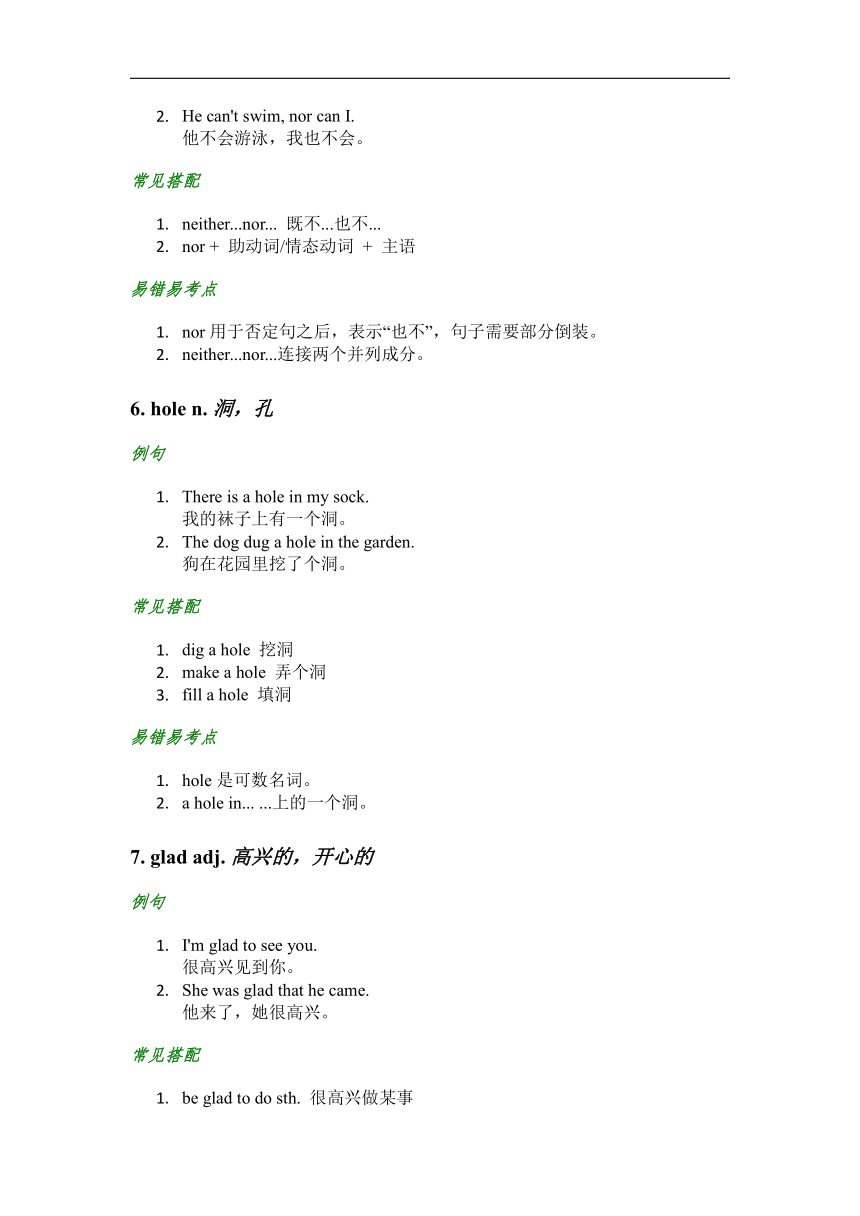
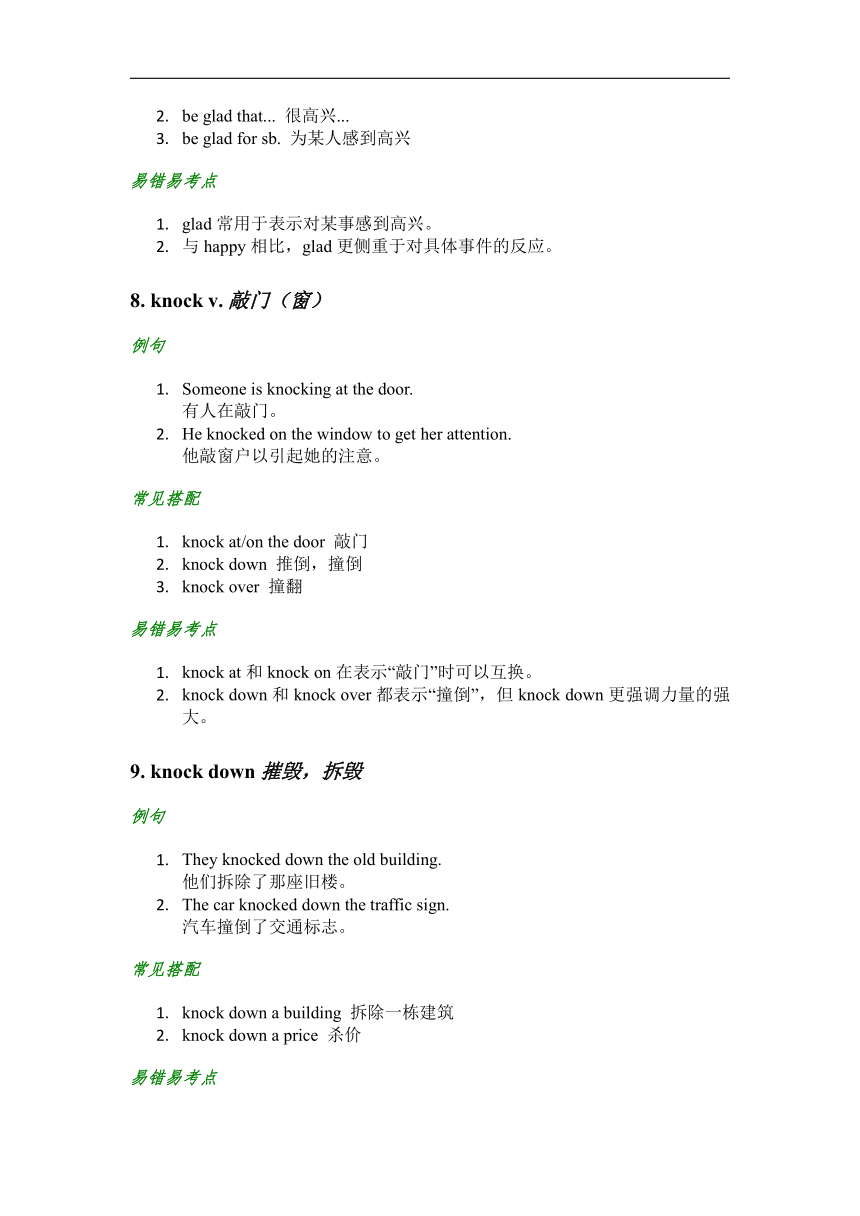
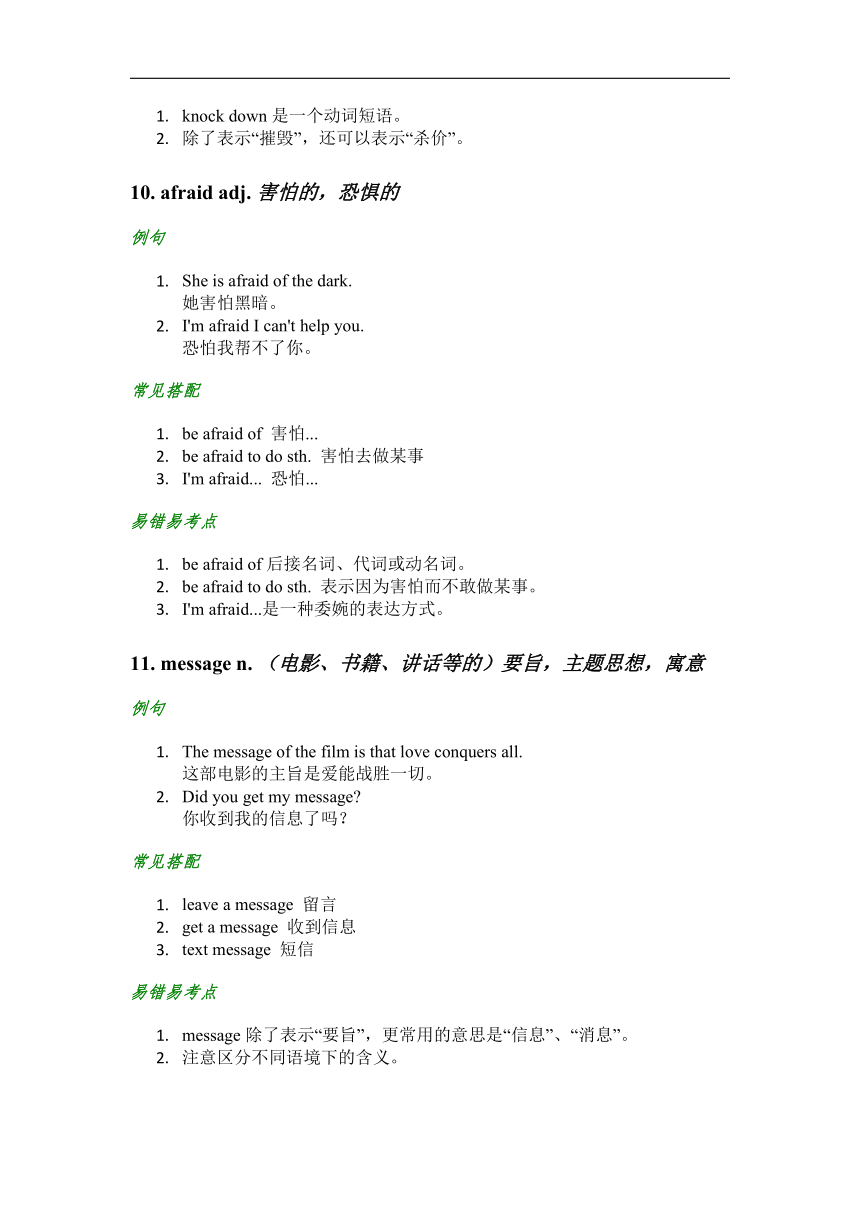
文档简介
Unit 2 Getting along 单词精讲讲义
1. shout v. 大声说,喊叫,呼喊
例句
Please don't shout, I can hear you.
请不要喊,我能听见你说话。
He shouted for help.
他大声呼救。
常见搭配
shout at sb. 对某人喊叫
shout for joy 高兴地喊叫
shout out 大声说出
易错易考点
shout at sb. 通常带有愤怒的情绪。
shout to sb. 只是为了让某人听到而大声喊。
2. gate n. 大门
例句
Please close the gate behind you.
请随手关门。
We entered through the main gate of the park.
我们从公园的正门进去了。
常见搭配
school gate 校门
front gate 前门
open/close the gate 开/关门
易错易考点
gate是可数名词。
指的是院子、建筑物或场地的入口处的大门。
3. build v. 建造,盖;造
例句
They are building a new bridge.
他们正在建一座新桥。
It took them two years to build the house.
他们花了两年时间盖这所房子。
常见搭配
build up 建立,增强
build a house 盖房子
build a relationship 建立关系
易错易考点
build的过去式和过去分词都是built。
build up可以指具体的建造,也可以指抽象的增强。
4. since prep./conj./adv. 自从·····以来,自从······之后
例句
I have been here since 9 a.m.
我从早上9点就一直在这里。
He has been busy since he came back.
他回来后一直很忙。
常见搭配
ever since 从那以后一直
since then 从那时起
since + a point in time/a clause
易错易考点
since引导的时间状语从句通常用一般过去时,主句用现在完成时。
since也可以表示“既然”,引导原因状语从句。
5. nor conj. 也不
例句
I don't like it, nor does she.
我不喜欢,她也不喜欢。
He can't swim, nor can I.
他不会游泳,我也不会。
常见搭配
neither...nor... 既不...也不...
nor + 助动词/情态动词 + 主语
易错易考点
nor用于否定句之后,表示“也不”,句子需要部分倒装。
neither...nor...连接两个并列成分。
6. hole n. 洞,孔
例句
There is a hole in my sock.
我的袜子上有一个洞。
The dog dug a hole in the garden.
狗在花园里挖了个洞。
常见搭配
dig a hole 挖洞
make a hole 弄个洞
fill a hole 填洞
易错易考点
hole是可数名词。
a hole in... ...上的一个洞。
7. glad adj. 高兴的,开心的
例句
I'm glad to see you.
很高兴见到你。
She was glad that he came.
他来了,她很高兴。
常见搭配
be glad to do sth. 很高兴做某事
be glad that... 很高兴...
be glad for sb. 为某人感到高兴
易错易考点
glad常用于表示对某事感到高兴。
与happy相比,glad更侧重于对具体事件的反应。
8. knock v. 敲门(窗)
例句
Someone is knocking at the door.
有人在敲门。
He knocked on the window to get her attention.
他敲窗户以引起她的注意。
常见搭配
knock at/on the door 敲门
knock down 推倒,撞倒
knock over 撞翻
易错易考点
knock at和knock on在表示“敲门”时可以互换。
knock down和knock over都表示“撞倒”,但knock down更强调力量的强大。
9. knock down 摧毁,拆毁
例句
They knocked down the old building.
他们拆除了那座旧楼。
The car knocked down the traffic sign.
汽车撞倒了交通标志。
常见搭配
knock down a building 拆除一栋建筑
knock down a price 杀价
易错易考点
knock down是一个动词短语。
除了表示“摧毁”,还可以表示“杀价”。
10. afraid adj. 害怕的,恐惧的
例句
She is afraid of the dark.
她害怕黑暗。
I'm afraid I can't help you.
恐怕我帮不了你。
常见搭配
be afraid of 害怕...
be afraid to do sth. 害怕去做某事
I'm afraid... 恐怕...
易错易考点
be afraid of后接名词、代词或动名词。
be afraid to do sth. 表示因为害怕而不敢做某事。
I'm afraid...是一种委婉的表达方式。
11. message n. (电影、书籍、讲话等的)要旨,主题思想,寓意
例句
The message of the film is that love conquers all.
这部电影的主旨是爱能战胜一切。
Did you get my message
你收到我的信息了吗?
常见搭配
leave a message 留言
get a message 收到信息
text message 短信
易错易考点
message除了表示“要旨”,更常用的意思是“信息”、“消息”。
注意区分不同语境下的含义。
12. double adj./adv./v./n. 双倍的,两倍的
例句
I'll have a double espresso, please.
请给我来一杯双份浓缩咖啡。
The price has doubled in the last year.
去年价格翻了一番。
常见搭配
double check 仔细检查
double room 双人房
on the double 很快地
易错易考点
double可以作形容词、副词、动词和名词。
作动词时,表示“翻倍”。
13. understanding n. 理解
例句
He has a good understanding of the problem.
他对这个问题有很好的理解。
Thank you for your understanding.
谢谢你的理解。
常见搭配
show understanding 表示理解
lack of understanding 缺乏理解
mutual understanding 相互理解
易错易考点
understanding是名词,表示“理解”。
动词形式是understand。
14. return v./n. 返回,回来,回去
例句
When did you return from your trip
你什么时候旅行回来的?
I need to return this book to the library.
我需要把这本书还给图书馆。
常见搭配
return home 回家
return to a place 回到某个地方
in return 作为回报
易错易考点
return既可作动词也可作名词。
return to a place表示“回到某个地方”,return sth. to sb.表示“把某物还给某人”。
15. lively adj. 充满活力的,生气勃勃的
例句
She has a lively personality.
她性格活泼。
It's a lively city with a lot to do.
这是一个充满活力的城市,有很多事情可做。
常见搭配
lively discussion 热烈的讨论
lively music 活泼的音乐
lively and interesting 生动有趣的
易错易考点
lively是形容词,以-ly结尾但不是副词。
表示“充满活力的”、“生机勃勃的”。
16. theirs pron. 他们的,她们的
例句
This book is theirs.
这本书是他们的。
Our car is bigger than theirs.
我们的车比他们的车大。
常见搭配
a friend of theirs 他们的一个朋友
易错易考点
theirs是名词性物主代词,相当于their + 名词。
不能与名词连用。
17. grade n. 年级
例句
My son is in the fifth grade.
我儿子上五年级。
She got a good grade on the exam.
她考试得了好成绩。
常见搭配
first grade 一年级
get good grades 取得好成绩
make the grade 达到标准
易错易考点
grade除了表示“年级”,还可以表示“成绩”、“等级”。
注意区分不同语境下的含义。
18. article n. (报刊的)文章
例句
I read an interesting article in the newspaper.
我在报纸上读了一篇有趣的文章。
She wrote an article about her travels.
她写了一篇关于她旅行的文章。
常见搭配
write an article 写一篇文章
read an article 读一篇文章
newspaper article 报纸文章
易错易考点
article是可数名词。
在语法中,article指冠词(a, an, the)。
19. priceless adj. 极其贵重的;无价的
例句
The museum has many priceless artifacts.
博物馆有许多无价之宝。
Her advice was priceless.
她的建议非常宝贵。
常见搭配
priceless treasure 无价之宝
priceless advice 宝贵的建议
priceless moment 宝贵的时刻
易错易考点
priceless表示“无价的”,强调价值极高,无法用金钱衡量。
不要与worthless(毫无价值的)混淆。
20. offer v./n. 提供,给予
例句
He offered me a cup of tea.
他给我端来一杯茶。
Thank you for your offer of help.
谢谢你主动提出帮助。
常见搭配
offer sb. sth. 给某人提供某物
offer to do sth. 主动提出做某事
special offer 特别优惠
易错易考点
offer既可作动词也可作名词。
offer to do sth. 表示主动提出做某事。
21. plan n./v. 计划
例句
What are your plans for the weekend
你周末有什么计划?
We are planning a trip to Europe.
我们正在计划去欧洲旅行。
常见搭配
make a plan 制定计划
plan to do sth. 计划做某事
according to plan 按计划
易错易考点
plan既可作名词也可作动词。
plan to do sth. 计划做某事。
22. quite adv. 很;较为
例句
The movie was quite good.
这部电影相当不错。
I'm quite tired today.
我今天很累。
常见搭配
quite a lot 相当多
quite a few 相当多
quite different 完全不同
易错易考点
quite a/an + 形容词 + 名词 = a very + 形容词 + 名词。
注意与quiet(安静的)的区别。
23. stressed adj. 焦虑的,紧张的,无法放松的
例句
I feel very stressed about the exam.
我对考试感到非常焦虑。
She has been very stressed recently.
她最近压力很大。
常见搭配
feel stressed 感到有压力
stressed out 压力过大
be stressed about 对...感到焦虑
易错易考点
stressed是形容词,表示“感到有压力的”。
名词形式是stress。
24. recently adv. 最近,近来,不久前
例句
I saw him recently.
我最近见过他。
Have you been to the cinema recently
你最近去看电影了吗?
常见搭配
only recently 直到最近
more recently 最近
易错易考点
recently常与现在完成时或一般过去时连用。
表示“最近”的时间段。
25. online adj./adv. 从网上,在网上
例句
I do my shopping online.
我在网上购物。
She is taking an online course.
她正在上网课。
常见搭配
online shopping 网上购物
online game 网络游戏
go online 上网
易错易考点
online既可作形容词也可作副词。
反义词是offline。
26. allow v. 使有可能;允许,容许,准许
例句
Smoking is not allowed in this room.
这个房间不准吸烟。
My parents don't allow me to stay out late.
我父母不允许我晚归。
常见搭配
allow sb. to do sth. 允许某人做某事
be allowed to do sth. 被允许做某事
allow for 考虑到
易错易考点
allow sb. to do sth. 允许某人做某事。
let sb. do sth. 让某人做某事,let更常用,allow更正式。
27. ticket n. 票,入场券
例句
I bought a ticket for the concert.
我买了一张音乐会的票。
Do you have your ticket
你带票了吗?
常见搭配
train ticket 火车票
movie ticket 电影票
buy a ticket 买票
易错易考点
ticket是可数名词。
a ticket to a place 去某地的票。
28. true adj. 真正的
例句
This is a true story.
这是一个真实的故事。
It's true that he is leaving.
他要离开是真的。
常见搭配
true love 真爱
true friend 真朋友
come true 实现
易错易考点
true是形容词,表示“真实的”、“真正的”。
名词形式是truth。
29. respect v./n. 尊重,顾及
例句
You should respect your elders.
你应该尊重长辈。
I have great respect for her.
我非常尊重她。
常见搭配
show respect for 表示对...的尊重
earn respect 赢得尊重
with all due respect 恕我直言
易错易考点
respect既可作动词也可作名词。
respect for sb./sth. 尊重某人/某事。
30. narrow adj. 狭窄的
例句
The bridge is too narrow for cars.
这座桥太窄了,汽车过不去。
He has a narrow mind.
他心胸狭窄。
常见搭配
narrow street 狭窄的街道
narrow escape 九死一生
narrow down 缩小范围
易错易考点
narrow是形容词,表示“狭窄的”。
反义词是wide。
31. lane n. ······巷(常用于路名中)
例句
He lives in a quiet lane.
他住在一个安静的小巷里。
The car changed lanes.
汽车变道了。
常见搭配
bike lane 自行车道
fast lane 快车道
memory lane 记忆中的往事
易错易考点
lane除了表示“小巷”,还可以表示“车道”。
注意区分不同语境下的含义。
32. unit n. (计量用的)单位
例句
A meter is a unit of length.
米是长度单位。
This book has ten units.
这本书有十个单元。
常见搭配
unit of measurement 计量单位
family unit 家庭单位
teaching unit 教学单元
易错易考点
unit除了表示“单位”,还可以表示“单元”、“部件”。
注意区分不同语境下的含义。
33. perhaps adv. 可能,大概,也许
例句
Perhaps he is not at home.
也许他不在家。
Perhaps we can go tomorrow.
也许我们明天可以去。
常见搭配
perhaps so 也许是这样
perhaps not 也许不是
易错易考点
perhaps是副词,表示“也许”、“可能”。
与maybe的用法相似,但perhaps更正式。
34. argue v. 争论,争吵
例句
They are always arguing about money.
他们总是为钱争吵。
I don't want to argue with you.
我不想和你争论。
常见搭配
argue with sb. about/over sth. 与某人争论某事
argue for/against sth. 赞成/反对某事
易错易考点
argue with sb. 与某人争吵。
argue for/against sth. 提出论点支持/反对某事。
35. divide v. (把······)分开
例句
The teacher divided the class into four groups.
老师把全班分成了四个小组。
10 divided by 2 is 5.
10除以2等于5。
常见搭配
divide into 分成
divide by 除以
divide sth. between/among sb. 把某物分给某人
易错易考点
divide A into B 把A分成B。
divide by 表示“除以”。
36. dividing line 分界线,界限
例句
The river is the dividing line between the two countries.
这条河是两国的分界线。
There is a thin dividing line between love and hate.
爱与恨之间只有一线之隔。
常见搭配
a clear dividing line 清晰的分界线
draw a dividing line 划清界限
易错易考点
dividing line是一个名词短语。
可以指具体的分界线,也可以指抽象的界限。
37. reach v. 实现,达成
例句
He finally reached his goal.
他终于实现了他的目标。
We reached the top of the mountain at noon.
我们中午到达了山顶。
常见搭配
reach a goal 实现目标
reach an agreement 达成协议
reach for sth. 伸手去拿某物
易错易考点
reach是及物动词,后面直接跟宾语。
arrive是不及物动词,需要加介词at或in。
38. agreement n. (意见的)一致,相合
例句
We finally reached an agreement.
我们最终达成了一致。
Are we in agreement
我们意见一致吗?
常见搭配
reach an agreement 达成协议
in agreement with 同意
come to an agreement 达成协议
易错易考点
agreement是名词,表示“协议”、“同意”。
动词形式是agree。
39. relative n. 家人;亲戚
例句
I'm going to visit my relatives during the holiday.
假期里我打算去看望我的亲戚。
He is a close relative of mine.
他是我的一个近亲。
常见搭配
close relative 近亲
distant relative 远亲
a relative of sb. 某人的亲戚
易错易考点
relative是可数名词。
也可以作形容词,表示“相对的”。
40. government n. 政府
例句
The government has announced new policies.
政府宣布了新政策。
He works for the government.
他在政府部门工作。
常见搭配
local government 地方政府
central government 中央政府
form a government 组建政府
易错易考点
government是可数名词。
动词形式是govern。
41. poem n. 诗;韵文
例句
He wrote a poem for his girlfriend.
他为女朋友写了一首诗。
I like reading ancient poems.
我喜欢读古诗。
常见搭配
write a poem 写诗
read a poem 读诗
a book of poems 一本诗集
易错易考点
poem是可数名词。
诗人是poet,诗歌是poetry。
42. inside prep./adv./n./adj. 在(容器或其他封闭的空间)里面
例句
What's inside the box
盒子里是什么?
Let's go inside.
我们进去吧。
常见搭配
inside out 里面翻到外面
from the inside 从内部
inside information 内部消息
易错易考点
inside可以作介词、副词、名词和形容词。
反义词是outside。
43. neighbour n. 邻居,邻人
例句
My neighbour is very friendly.
我的邻居很友好。
We have good neighbours.
我们有很好的邻居。
常见搭配
next-door neighbour 隔壁邻居
good neighbour 好邻居
易错易考点
neighbour是可数名词。
美式拼写是neighbor。
44. act v./n. 行为,行动,动作,举动
例句
We must act now before it's too late.
我们必须在为时已晚之前立即采取行动。
His brave act saved the child's life.
他的英勇行为挽救了孩子的生命。
常见搭配
act as 充当
act on 按照...行事
a kind act 善举
易错易考点
act既可作动词也可作名词。
动词形式是act,名词形式是action。
45. pass v. 过去,流逝
例句
Time passes quickly.
时间过得很快。
He passed me in the street.
他在街上从我身边经过。
常见搭配
pass by 经过
pass away 去世
pass an exam 通过考试
易错易考点
pass away是“去世”的委婉说法。
pass an exam表示“通过考试”。
46. whenever conj. 每当
例句
You can come whenever you like.
你想什么时候来就什么时候来。
Whenever I see her, she is smiling.
每次我见到她,她都在微笑。
常见搭配
whenever possible 只要有可能
易错易考点
whenever引导时间状语从句,表示“每当”、“无论何时”。
也可以引导让步状语从句,表示“无论何时”。
1. shout v. 大声说,喊叫,呼喊
例句
Please don't shout, I can hear you.
请不要喊,我能听见你说话。
He shouted for help.
他大声呼救。
常见搭配
shout at sb. 对某人喊叫
shout for joy 高兴地喊叫
shout out 大声说出
易错易考点
shout at sb. 通常带有愤怒的情绪。
shout to sb. 只是为了让某人听到而大声喊。
2. gate n. 大门
例句
Please close the gate behind you.
请随手关门。
We entered through the main gate of the park.
我们从公园的正门进去了。
常见搭配
school gate 校门
front gate 前门
open/close the gate 开/关门
易错易考点
gate是可数名词。
指的是院子、建筑物或场地的入口处的大门。
3. build v. 建造,盖;造
例句
They are building a new bridge.
他们正在建一座新桥。
It took them two years to build the house.
他们花了两年时间盖这所房子。
常见搭配
build up 建立,增强
build a house 盖房子
build a relationship 建立关系
易错易考点
build的过去式和过去分词都是built。
build up可以指具体的建造,也可以指抽象的增强。
4. since prep./conj./adv. 自从·····以来,自从······之后
例句
I have been here since 9 a.m.
我从早上9点就一直在这里。
He has been busy since he came back.
他回来后一直很忙。
常见搭配
ever since 从那以后一直
since then 从那时起
since + a point in time/a clause
易错易考点
since引导的时间状语从句通常用一般过去时,主句用现在完成时。
since也可以表示“既然”,引导原因状语从句。
5. nor conj. 也不
例句
I don't like it, nor does she.
我不喜欢,她也不喜欢。
He can't swim, nor can I.
他不会游泳,我也不会。
常见搭配
neither...nor... 既不...也不...
nor + 助动词/情态动词 + 主语
易错易考点
nor用于否定句之后,表示“也不”,句子需要部分倒装。
neither...nor...连接两个并列成分。
6. hole n. 洞,孔
例句
There is a hole in my sock.
我的袜子上有一个洞。
The dog dug a hole in the garden.
狗在花园里挖了个洞。
常见搭配
dig a hole 挖洞
make a hole 弄个洞
fill a hole 填洞
易错易考点
hole是可数名词。
a hole in... ...上的一个洞。
7. glad adj. 高兴的,开心的
例句
I'm glad to see you.
很高兴见到你。
She was glad that he came.
他来了,她很高兴。
常见搭配
be glad to do sth. 很高兴做某事
be glad that... 很高兴...
be glad for sb. 为某人感到高兴
易错易考点
glad常用于表示对某事感到高兴。
与happy相比,glad更侧重于对具体事件的反应。
8. knock v. 敲门(窗)
例句
Someone is knocking at the door.
有人在敲门。
He knocked on the window to get her attention.
他敲窗户以引起她的注意。
常见搭配
knock at/on the door 敲门
knock down 推倒,撞倒
knock over 撞翻
易错易考点
knock at和knock on在表示“敲门”时可以互换。
knock down和knock over都表示“撞倒”,但knock down更强调力量的强大。
9. knock down 摧毁,拆毁
例句
They knocked down the old building.
他们拆除了那座旧楼。
The car knocked down the traffic sign.
汽车撞倒了交通标志。
常见搭配
knock down a building 拆除一栋建筑
knock down a price 杀价
易错易考点
knock down是一个动词短语。
除了表示“摧毁”,还可以表示“杀价”。
10. afraid adj. 害怕的,恐惧的
例句
She is afraid of the dark.
她害怕黑暗。
I'm afraid I can't help you.
恐怕我帮不了你。
常见搭配
be afraid of 害怕...
be afraid to do sth. 害怕去做某事
I'm afraid... 恐怕...
易错易考点
be afraid of后接名词、代词或动名词。
be afraid to do sth. 表示因为害怕而不敢做某事。
I'm afraid...是一种委婉的表达方式。
11. message n. (电影、书籍、讲话等的)要旨,主题思想,寓意
例句
The message of the film is that love conquers all.
这部电影的主旨是爱能战胜一切。
Did you get my message
你收到我的信息了吗?
常见搭配
leave a message 留言
get a message 收到信息
text message 短信
易错易考点
message除了表示“要旨”,更常用的意思是“信息”、“消息”。
注意区分不同语境下的含义。
12. double adj./adv./v./n. 双倍的,两倍的
例句
I'll have a double espresso, please.
请给我来一杯双份浓缩咖啡。
The price has doubled in the last year.
去年价格翻了一番。
常见搭配
double check 仔细检查
double room 双人房
on the double 很快地
易错易考点
double可以作形容词、副词、动词和名词。
作动词时,表示“翻倍”。
13. understanding n. 理解
例句
He has a good understanding of the problem.
他对这个问题有很好的理解。
Thank you for your understanding.
谢谢你的理解。
常见搭配
show understanding 表示理解
lack of understanding 缺乏理解
mutual understanding 相互理解
易错易考点
understanding是名词,表示“理解”。
动词形式是understand。
14. return v./n. 返回,回来,回去
例句
When did you return from your trip
你什么时候旅行回来的?
I need to return this book to the library.
我需要把这本书还给图书馆。
常见搭配
return home 回家
return to a place 回到某个地方
in return 作为回报
易错易考点
return既可作动词也可作名词。
return to a place表示“回到某个地方”,return sth. to sb.表示“把某物还给某人”。
15. lively adj. 充满活力的,生气勃勃的
例句
She has a lively personality.
她性格活泼。
It's a lively city with a lot to do.
这是一个充满活力的城市,有很多事情可做。
常见搭配
lively discussion 热烈的讨论
lively music 活泼的音乐
lively and interesting 生动有趣的
易错易考点
lively是形容词,以-ly结尾但不是副词。
表示“充满活力的”、“生机勃勃的”。
16. theirs pron. 他们的,她们的
例句
This book is theirs.
这本书是他们的。
Our car is bigger than theirs.
我们的车比他们的车大。
常见搭配
a friend of theirs 他们的一个朋友
易错易考点
theirs是名词性物主代词,相当于their + 名词。
不能与名词连用。
17. grade n. 年级
例句
My son is in the fifth grade.
我儿子上五年级。
She got a good grade on the exam.
她考试得了好成绩。
常见搭配
first grade 一年级
get good grades 取得好成绩
make the grade 达到标准
易错易考点
grade除了表示“年级”,还可以表示“成绩”、“等级”。
注意区分不同语境下的含义。
18. article n. (报刊的)文章
例句
I read an interesting article in the newspaper.
我在报纸上读了一篇有趣的文章。
She wrote an article about her travels.
她写了一篇关于她旅行的文章。
常见搭配
write an article 写一篇文章
read an article 读一篇文章
newspaper article 报纸文章
易错易考点
article是可数名词。
在语法中,article指冠词(a, an, the)。
19. priceless adj. 极其贵重的;无价的
例句
The museum has many priceless artifacts.
博物馆有许多无价之宝。
Her advice was priceless.
她的建议非常宝贵。
常见搭配
priceless treasure 无价之宝
priceless advice 宝贵的建议
priceless moment 宝贵的时刻
易错易考点
priceless表示“无价的”,强调价值极高,无法用金钱衡量。
不要与worthless(毫无价值的)混淆。
20. offer v./n. 提供,给予
例句
He offered me a cup of tea.
他给我端来一杯茶。
Thank you for your offer of help.
谢谢你主动提出帮助。
常见搭配
offer sb. sth. 给某人提供某物
offer to do sth. 主动提出做某事
special offer 特别优惠
易错易考点
offer既可作动词也可作名词。
offer to do sth. 表示主动提出做某事。
21. plan n./v. 计划
例句
What are your plans for the weekend
你周末有什么计划?
We are planning a trip to Europe.
我们正在计划去欧洲旅行。
常见搭配
make a plan 制定计划
plan to do sth. 计划做某事
according to plan 按计划
易错易考点
plan既可作名词也可作动词。
plan to do sth. 计划做某事。
22. quite adv. 很;较为
例句
The movie was quite good.
这部电影相当不错。
I'm quite tired today.
我今天很累。
常见搭配
quite a lot 相当多
quite a few 相当多
quite different 完全不同
易错易考点
quite a/an + 形容词 + 名词 = a very + 形容词 + 名词。
注意与quiet(安静的)的区别。
23. stressed adj. 焦虑的,紧张的,无法放松的
例句
I feel very stressed about the exam.
我对考试感到非常焦虑。
She has been very stressed recently.
她最近压力很大。
常见搭配
feel stressed 感到有压力
stressed out 压力过大
be stressed about 对...感到焦虑
易错易考点
stressed是形容词,表示“感到有压力的”。
名词形式是stress。
24. recently adv. 最近,近来,不久前
例句
I saw him recently.
我最近见过他。
Have you been to the cinema recently
你最近去看电影了吗?
常见搭配
only recently 直到最近
more recently 最近
易错易考点
recently常与现在完成时或一般过去时连用。
表示“最近”的时间段。
25. online adj./adv. 从网上,在网上
例句
I do my shopping online.
我在网上购物。
She is taking an online course.
她正在上网课。
常见搭配
online shopping 网上购物
online game 网络游戏
go online 上网
易错易考点
online既可作形容词也可作副词。
反义词是offline。
26. allow v. 使有可能;允许,容许,准许
例句
Smoking is not allowed in this room.
这个房间不准吸烟。
My parents don't allow me to stay out late.
我父母不允许我晚归。
常见搭配
allow sb. to do sth. 允许某人做某事
be allowed to do sth. 被允许做某事
allow for 考虑到
易错易考点
allow sb. to do sth. 允许某人做某事。
let sb. do sth. 让某人做某事,let更常用,allow更正式。
27. ticket n. 票,入场券
例句
I bought a ticket for the concert.
我买了一张音乐会的票。
Do you have your ticket
你带票了吗?
常见搭配
train ticket 火车票
movie ticket 电影票
buy a ticket 买票
易错易考点
ticket是可数名词。
a ticket to a place 去某地的票。
28. true adj. 真正的
例句
This is a true story.
这是一个真实的故事。
It's true that he is leaving.
他要离开是真的。
常见搭配
true love 真爱
true friend 真朋友
come true 实现
易错易考点
true是形容词,表示“真实的”、“真正的”。
名词形式是truth。
29. respect v./n. 尊重,顾及
例句
You should respect your elders.
你应该尊重长辈。
I have great respect for her.
我非常尊重她。
常见搭配
show respect for 表示对...的尊重
earn respect 赢得尊重
with all due respect 恕我直言
易错易考点
respect既可作动词也可作名词。
respect for sb./sth. 尊重某人/某事。
30. narrow adj. 狭窄的
例句
The bridge is too narrow for cars.
这座桥太窄了,汽车过不去。
He has a narrow mind.
他心胸狭窄。
常见搭配
narrow street 狭窄的街道
narrow escape 九死一生
narrow down 缩小范围
易错易考点
narrow是形容词,表示“狭窄的”。
反义词是wide。
31. lane n. ······巷(常用于路名中)
例句
He lives in a quiet lane.
他住在一个安静的小巷里。
The car changed lanes.
汽车变道了。
常见搭配
bike lane 自行车道
fast lane 快车道
memory lane 记忆中的往事
易错易考点
lane除了表示“小巷”,还可以表示“车道”。
注意区分不同语境下的含义。
32. unit n. (计量用的)单位
例句
A meter is a unit of length.
米是长度单位。
This book has ten units.
这本书有十个单元。
常见搭配
unit of measurement 计量单位
family unit 家庭单位
teaching unit 教学单元
易错易考点
unit除了表示“单位”,还可以表示“单元”、“部件”。
注意区分不同语境下的含义。
33. perhaps adv. 可能,大概,也许
例句
Perhaps he is not at home.
也许他不在家。
Perhaps we can go tomorrow.
也许我们明天可以去。
常见搭配
perhaps so 也许是这样
perhaps not 也许不是
易错易考点
perhaps是副词,表示“也许”、“可能”。
与maybe的用法相似,但perhaps更正式。
34. argue v. 争论,争吵
例句
They are always arguing about money.
他们总是为钱争吵。
I don't want to argue with you.
我不想和你争论。
常见搭配
argue with sb. about/over sth. 与某人争论某事
argue for/against sth. 赞成/反对某事
易错易考点
argue with sb. 与某人争吵。
argue for/against sth. 提出论点支持/反对某事。
35. divide v. (把······)分开
例句
The teacher divided the class into four groups.
老师把全班分成了四个小组。
10 divided by 2 is 5.
10除以2等于5。
常见搭配
divide into 分成
divide by 除以
divide sth. between/among sb. 把某物分给某人
易错易考点
divide A into B 把A分成B。
divide by 表示“除以”。
36. dividing line 分界线,界限
例句
The river is the dividing line between the two countries.
这条河是两国的分界线。
There is a thin dividing line between love and hate.
爱与恨之间只有一线之隔。
常见搭配
a clear dividing line 清晰的分界线
draw a dividing line 划清界限
易错易考点
dividing line是一个名词短语。
可以指具体的分界线,也可以指抽象的界限。
37. reach v. 实现,达成
例句
He finally reached his goal.
他终于实现了他的目标。
We reached the top of the mountain at noon.
我们中午到达了山顶。
常见搭配
reach a goal 实现目标
reach an agreement 达成协议
reach for sth. 伸手去拿某物
易错易考点
reach是及物动词,后面直接跟宾语。
arrive是不及物动词,需要加介词at或in。
38. agreement n. (意见的)一致,相合
例句
We finally reached an agreement.
我们最终达成了一致。
Are we in agreement
我们意见一致吗?
常见搭配
reach an agreement 达成协议
in agreement with 同意
come to an agreement 达成协议
易错易考点
agreement是名词,表示“协议”、“同意”。
动词形式是agree。
39. relative n. 家人;亲戚
例句
I'm going to visit my relatives during the holiday.
假期里我打算去看望我的亲戚。
He is a close relative of mine.
他是我的一个近亲。
常见搭配
close relative 近亲
distant relative 远亲
a relative of sb. 某人的亲戚
易错易考点
relative是可数名词。
也可以作形容词,表示“相对的”。
40. government n. 政府
例句
The government has announced new policies.
政府宣布了新政策。
He works for the government.
他在政府部门工作。
常见搭配
local government 地方政府
central government 中央政府
form a government 组建政府
易错易考点
government是可数名词。
动词形式是govern。
41. poem n. 诗;韵文
例句
He wrote a poem for his girlfriend.
他为女朋友写了一首诗。
I like reading ancient poems.
我喜欢读古诗。
常见搭配
write a poem 写诗
read a poem 读诗
a book of poems 一本诗集
易错易考点
poem是可数名词。
诗人是poet,诗歌是poetry。
42. inside prep./adv./n./adj. 在(容器或其他封闭的空间)里面
例句
What's inside the box
盒子里是什么?
Let's go inside.
我们进去吧。
常见搭配
inside out 里面翻到外面
from the inside 从内部
inside information 内部消息
易错易考点
inside可以作介词、副词、名词和形容词。
反义词是outside。
43. neighbour n. 邻居,邻人
例句
My neighbour is very friendly.
我的邻居很友好。
We have good neighbours.
我们有很好的邻居。
常见搭配
next-door neighbour 隔壁邻居
good neighbour 好邻居
易错易考点
neighbour是可数名词。
美式拼写是neighbor。
44. act v./n. 行为,行动,动作,举动
例句
We must act now before it's too late.
我们必须在为时已晚之前立即采取行动。
His brave act saved the child's life.
他的英勇行为挽救了孩子的生命。
常见搭配
act as 充当
act on 按照...行事
a kind act 善举
易错易考点
act既可作动词也可作名词。
动词形式是act,名词形式是action。
45. pass v. 过去,流逝
例句
Time passes quickly.
时间过得很快。
He passed me in the street.
他在街上从我身边经过。
常见搭配
pass by 经过
pass away 去世
pass an exam 通过考试
易错易考点
pass away是“去世”的委婉说法。
pass an exam表示“通过考试”。
46. whenever conj. 每当
例句
You can come whenever you like.
你想什么时候来就什么时候来。
Whenever I see her, she is smiling.
每次我见到她,她都在微笑。
常见搭配
whenever possible 只要有可能
易错易考点
whenever引导时间状语从句,表示“每当”、“无论何时”。
也可以引导让步状语从句,表示“无论何时”。
同课章节目录
